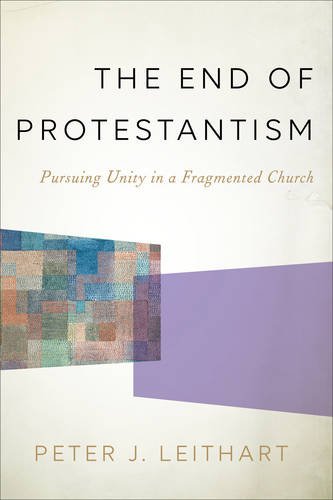Book Review: The End of Protestantism
Author: Peter Leithart
Publisher: Brazos Press
Reading Level: Moderate
Pages: 240
There are few words that provoke more consternation from conservative Christians than "ecumenical" or "ecumenism." The terms call to mind the dwindling down of deep theology to some generic middle ground. On a global level, the practice has belonged mainly to mainline churches whose modernization of traditional doctrines has frustrated conservative denominations.
Peter Leithart's entry into ecumenical discussion has occurred through insightful blogs on First Things and in engaging forum conversations with Fred Sanders and Carl Trueman. His writing on the subject of "Reformed Catholicity" has prompted a number of responses and engagements from Christians of all traditions. The End of Protestantism: Pursuing Unity in a Fragmented Church is the matured result of these discussions and engagements.
Leithart's arguments are simple. Christ's prayer in John 17 is for a unified church. The church has a history of relative unity (not including the breaking off of creedal "heretics"). Though the church currently exists in fragmented denominations, it is incorrect to perceive God's work in the church as concluded. Thus, Leithart writes to Protestants urging them to live now as the church they eventually will be.
More specifically, Leithart writes critically to American Protestants about their acceptance of tribal denominationalism. Within The End of Protestantism these chapters are grouped as "Movement Two: Church Divided." This is where Leithart's writing hits hardest for American Evangelicals. The criticisms here are valuable particularly because they are pointedly local. Leithart's solutions are not some top down ecumenical council but a movement of lay people and churches towards one another in engagements of doctrine and worship.
Despite Leithart's clear purpose, some of the chapters and presentations are not obviously—or concretely—connected to the main thesis. Some of these seemingly disconnected portions are valuable (e.g. discussions of racism; the relationship of immigration and anti-Catholicism). Some of these disconnected sections seemingly serve no purpose (e.g. the unnecessary "Intermezzo" re-telling of the Scripture).
The End of Protestantism concludes with the practical outworking of Leithart's thought that should have permeated the entire work. Practical discussion of doctrines and worship between Catholics, Protestants and Orthodox are woefully rushed at the expense of other diluted and high level introspection.
In conclusion, Peter Leithart's The End of Protestantism: Pursing Unity in a Fragmented Church is a flawed attempt at a worthy cause. The mission statement should be encouraged, the practical exhortations are needed, but the material presentation is lacking. This may encourage discussions of conservative ecumenicalism but it does not thoroughly discuss conservative ecumenicalism.
Editor's Note: Multiple blog posts also engage the content of The End of Protestantism
Disclosure of Material Connection: I received this book free from the publisher. I was not required to write a positive review. The opinions I have expressed are my own. I am disclosing this in accordance with the Federal Trade Commission's 16 CFR, Part 255: "Guides Concerning the Use of Endorsements and Testimonials in Advertising.







